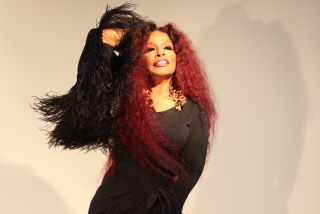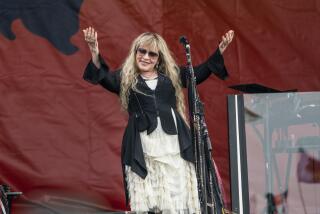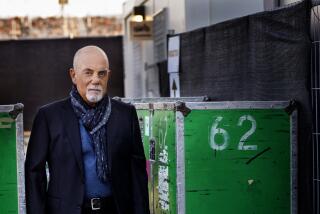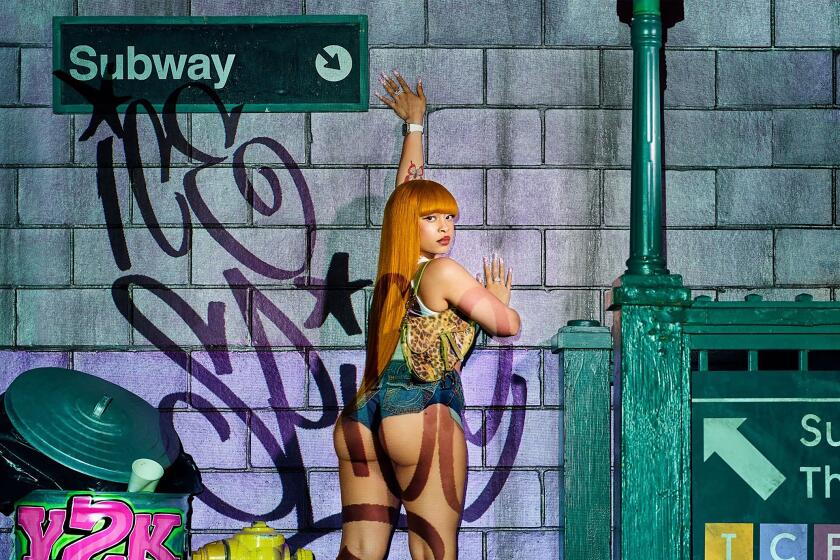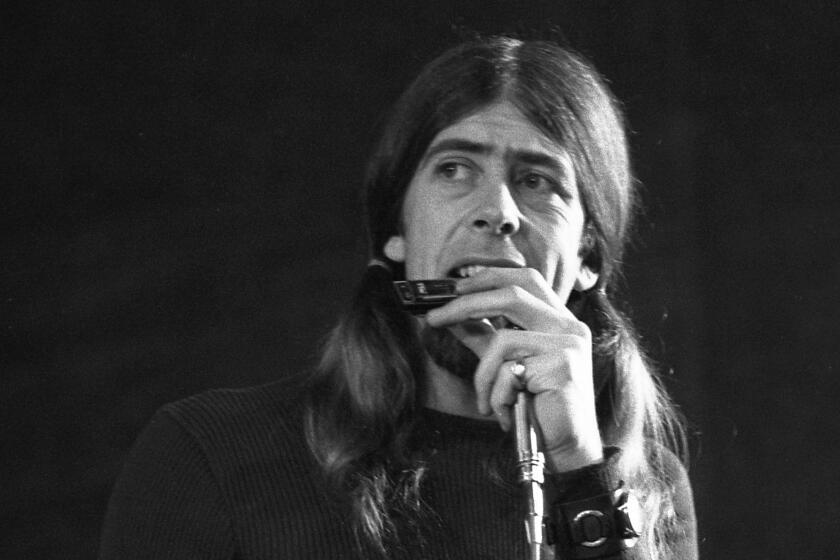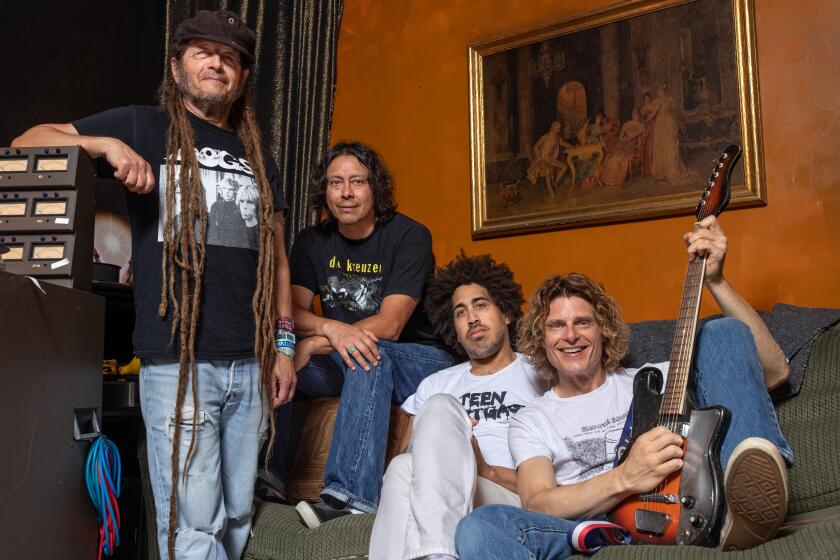You Say You Want a Revolution? : Well, You Know, Pere Ubu Still Believes in a Brave New World, Though Its Rock Has Evolved
For a doomed enterprise, Pere Ubu hasn’t done so badly.
As singer David Thomas tells it, the band was doomed--his term--from its inception in Cleveland back in 1975. It courted that doom, Thomas says, by harboring revolutionary hopes for rock music.
“Our particular generation was doomed, because we believed the day of the teen idol in rock music was over, that it would never return to teen nonsense,” Thomas, who will front Pere Ubu on Saturday night at Bogart’s in Long Beach, said in a recent phone interview from a tour stop in Columbus, Ohio.
“We believed it was our mission to build a brave new world, and that rock music was the poetry that could express all of human experience. We seriously believed we could change the face of music--we and our comrades, like (Tom) Verlaine and (David) Byrne. The New Wave generation of which we were part, we turned to our forebears”--Thomas mentions Brian Wilson, Captain Beefheart, Frank Zappa, Bob Dylan and “100 guys known and 1,000 guys unknown” as Pere Ubu’s honored ‘60s precursors--”and said, ‘Well done, hand us the torch and we’ll build the brave new world.’ We didn’t think in terms of career. We were purists, true believers.”
In case you haven’t seen any MTV lately, careerism reigns, and teen idolatry did not topple. But if Pere Ubu failed as a revolutionary cell, at least it has succeeded in making interesting, influential music over a long arc of time without standing pat. Today the band is still around, providing an alternative for those who want more out of rock than glamorous schlock (you really can’t blame a guy for feeling doomed if his life’s work over 16 years has reached fewer ears than debut albums by the likes of Trixter and Slaughter).
But better doomed than dumb.
“We still believe,” said Thomas, who will turn 38 on Friday. “We’re doomed by that belief that music should be something moving, and that its only object is to be a personally moving experience and a socially and communally moving experience.”
In its early days, Pere Ubu’s vision of the brave new world tended to be noisy and dark as the band fleshed out its basic garage-rock song craft with assaultive blasts of synthesizer sound. Thomas, whose bulky, animated stage presence always draws comparisons to Ralph Kramden, developed a high, theatrical yowl that was something like Byrne’s early Talking Heads style--although it wasn’t always clear what words Thomas was yowling amid the din.
Pere Ubu had an initial run from 1975 to 1982. Thomas was the lone constant, but synthesizer player Allen Ravenstine, drummer Scott Krauss and bassist Tony Maimone were along for most of the ride in an otherwise oft-changing lineup.
“We did a number of headstrong things” in the early days for the sake of artistic independence, Thomas said. “If we were looking to be commercial, we never should have done ‘Art of Walking,’ ” one of the band’s most abstract albums. “But we weren’t looking to make commercial decisions. ‘Art of Walking’ was a very necessary album to make.”
After Pere Ubu broke up, Thomas moved to London--not to be part of the city’s rock scene, but because his wife is British--and launched a solo career. By 1986, Maimone and Ravenstine were back with him as members of a band called the Wooden Birds. When Krauss joined in, too, they figured there were enough former Ubu peers around to justify a resurrection of the old name. Pere Ubu returned as a recording band in 1988 with “The Tenement Year.” In case anyone thought time had eroded its penchant for noisy ways and placing uncommon demands on listeners, the album began with a squalling, static-filled din. The object seemed to be to explore how dissonant and quirky they could be while still working in a recognizable, basic garage-rock tradition.
Lately, though, Pere Ubu has toned down the noise and emerged with clean, accessible pop songs.
“One of the fundamentals of Pere Ubu is that sound has a visual component, a sound that engages the imagination of the listener and produces a landscape” Thomas said by way of explaining where the noisy side came from, and where it has gone. On 1989’s “Cloudland” and the new “Worlds in Collision,” he said, “we wanted to stress the voice of Ubu, the poetic vision. We decided to back down the visuals in deference to the emotional language we use. On ‘Tenement Year,’ the visual language is pumped up--lots of ideas, lots of noise, lots of kitchen sinks.” The two latest albums, he said, “are more to do with directness and focus.”
Ravenstine’s departure after “Cloudland” (he makes a guest appearance on “Worlds”) wasn’t a protest against the muting of noise, Thomas said, but a simple case of weariness. “These are Allen’s two favorite records,” he said, adding that Ravenstine now generates sonic blast by revving up jet engines as a pilot for Northwest Airlines. The current Pere Ubu lineup features Thomas, Maimone and Krauss from the band’s first run, along with guitarist Jim Jones and keyboardist Eric Drew Feldman, a veteran of Captain Beefheart’s Magic Band.
In keeping with the idea of sticking to direct “emotional language,” Ubu has centered its two most recent albums on that most familiar of emotional subjects, romantic heartbreak. Most of the songs on “Cloudland” examine the dynamics of a relationship falling apart; “Worlds in Collision” takes the idea a step further, showing how a sundered romance can discombobulate one’s whole philosophy and outlook on the universe. Or, as Thomas succinctly and plaintively asks during the song “Playback”: “When a heart falls apart, will we still be who we are?”
Far from being downers, the two albums are lifted by their pop appeal and sense of humor. The heartbreaks Thomas chronicles are genuine, his born role-actor’s voice resembling a less growly, upper-register cousin to that heartbreak king, Tom Waits. At the same time, wryly ironic touches and occasional exaggeration keep the songs from wallowing in misery, as Waits at his soppiest is prone to do.
There also is fun in the steady parade of roots-rock stylistic references and direct quotations from rock’s past, some of them skillfully used to embellish meanings. For example, “Nevada!” borrows the Beach Boys’ “Sloop John B,” but recasts the seafaring folk ballad in an arid, landlocked desert--a touch that adds an extra measure of anguish and acerbic bite to the song’s portrayal of a marriage gone dry. In all, Ubu’s latest direction demonstrates that a move to clarity and accessibility doesn’t have to close the spigot on ideas and imagination.
In one of the band’s funnier recent bits, “Ice Cream Truck,” from “Cloudland,” Pere Ubu suggests closing the spigot on music altogether. Thomas plays the role of a Randy Newman-style curmudgeon, who hears one more melody than he can stand (coming from an ice cream truck) and complains that rock bands got no reason to live.
“There’s too much music in the land,” Thomas yelps in a David Byrne-ish voice. “You hear it everywhere, everybody’s in a band.”
Doomed as it is, Pere Ubu isn’t volunteering to be the first to shut up.
“It won’t make any difference to the world if Pere Ubu quits,” Thomas said. “We’re tired of going first. We’ll wait till somebody like R.E.M., at the peak of their career, says, ‘For the good of the world, we won’t make a sound anymore.’ I think the world could easily do without the entertainment-business empire anymore. It could step into oblivion without too much damage to the state of mental health.”
If that were to come to pass, Thomas said, “I’d get a real job. Something useful.”
Until that revolution comes, Pere Ubu will keep riding its own ice cream truck.
“It would be nice to do more records,” Thomas said when asked what his ambitions are these days. “What I like the most is writing songs, sitting down with a piece of music and determining what it’s about. That is the best stuff, and it only happens in private. That’s what I’m addicted to, the process of making records. Like any junkie, I have to keep doing it.”
* Pere Ubu and Monks of Doom play Saturday night at 9:30 at Bogart’s, 6288 E. Pacific Coast Highway, in the Marina Pacifica Mall, Long Beach. Tickets: $12.50. Information: (213) 594-8975.
More to Read
The biggest entertainment stories
Get our big stories about Hollywood, film, television, music, arts, culture and more right in your inbox as soon as they publish.
You may occasionally receive promotional content from the Los Angeles Times.
